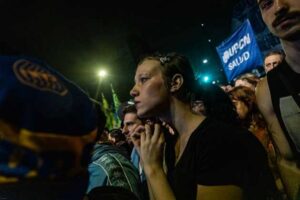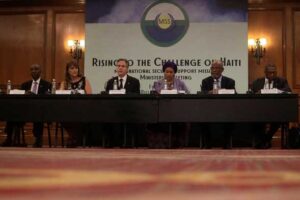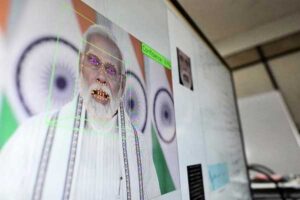
Civil Society, Crime & Justice, Democracy, Economy & Trade, Environment, Headlines, Human Rights, Latin America & the Caribbean, TerraViva United Nations

First Round of the elections in Argentina in 2023. Credit: Midia Ninja
– Between the Mafia and the State, I prefer the Mafia. The mafia has codes, it keeps its promises, it doesn’t lie, it’s competitive. If a company pollutes a river, where is the damage? The sale of organs is a market like any other. Abortion should be considered “aggravated murder”.
These are just a couple of quotes from former TV pundit Javier Milei, now president of Argentina, as he makes anti-progressism his trademark, borrowying from the ready-made discourse of the globalalt-right. He claims that global warming is “another lie of socialism”.
In recent months, Argentina has witnessed a significant shift under his new administration that threatens to undermine the very fabric of its civil society and democratic governance.
On June 12th, there was a violent crackdown on protesters outside the National Congress, involving the use of batons, tear gas, and rubber bullets. Several individuals were arrested arbitrarily and subsequently labeled as “terrorists” by the government, a move clearly intended to intimidate civil society and criminalize protest. These detainees have been transferred to federal prisons, where reports indicate continued abuse, including the use of pepper spray, physical violence, and denial of basic rights.
Last Friday, the government sent another controversial bill to Congress looking to lower the age of criminal responsibility from 16 to 13, even though minors commit less than 1% of serious crimes in Argentina. A proposal that was labelled by opposers as “pure smoke and mirrors.”
Since taking office, President Javier Milei’s administration has received significant international criticism, including from UN High Commissioner for Human Rights Volker Türk and the Inter-American Commission on Human Rights which has scheduled a hearing on July 11th to address the situation.
“A President proud to repress”, this is what various media across Argentina wrote as Milei went as far as accusing protesters of being “terrorists” and said police violence prevented a “coup d’état”.
These alarming development mark a stark contrast to the country’s long-standing commitment to democracy and human rights, a commitment that has been painstakingly nurtured since the end of its brutal military dictatorship in 1983.
Moreover, this change of administration has been accompanied by an abrupt “retreat” of the state from its historic role as guarantor of the rights of its citizens. This abdication by the State of its essential responsibilities adds even more concerns to the already alarming measures explicitly restricting civic space.
Javier Milei’s aggressive and theatrical style – from superhero costumes to wielding a chainsaw to illustrate his plans to cut down the size of the state – has led some to compare him to Donald Trump in the US or Jair Bolsonaro of Brazil. This shift, alongside the blurring of ideological lines between the Peronist and Together for Change coalitions, has implications for Argentina’s political landscape and on civic space.
Argentina’s civil society organizations, long the backbone of its democratic resilience and human rights advocacy, face unprecedented challenges.
Legislative proposals aimed at restricting their activities, coupled with limitations on freedom of expression and the right to protest, have sent shockwaves through the community. The administration’s policies include drastic public spending cuts, the closure of state institutions dedicated to women’s rights and access to justice, and a suspension of participation in international events related to the 2030 Agenda.
A recent protocol, announced by Security Minister Patricia Bullrich, involves identifying protesters through various means and then billing them for the costs incurred by deploying security forces to police the demonstrations. Human rights activists, opposition legislators, and organizations like the Centre of Legal Studies (CELS) argue that these measures effectively criminalize legitimate protests and violate constitutional rights. The government’s allies, such as legislator José Luis Espert, have responded with aggressive rhetoric: “Prison or bullet”.
Recently, a violent attack against a member of the organization H.I.J.O.S., known for its fight against impunity for the crimes of the last civil-military dictatorship and for the defense of human rights, has been denounced. This attack, characterized by its brutality and strong political message, reflects an alarming increase in violence against activists and civil society organizations. The attackers, by leaving the acronym VLLC (“Viva la libertad, carajo!”), associated with President Javier Milei, insinuate a disturbing link between government rhetoric and violent actions directed against “dissidents”.
These proposals, exacerbated by the country’s ongoing economic and social crises, pose new hurdles for civil society’s ability to operate and advocate for public interests.
Argentina’s history, marked by the dark years of dictatorship between 1976 and 1983, serves as a reminder of the cost of silence and inaction. The country’s journey to reclaim democracy and human rights was arduous, characterized by relentless efforts to acknowledge and compensate the victims of past repression. The current administration’s move to revise policies related to memory, truth, and human rights threatens to undo decades of progress, challenging the very essence of Argentina’s democratic sphere.
The international community, particularly organizations dedicated to the promotion of human rights and the preservation of historical memory, such as UNESCO, must heed this call to action.
The situation in Argentina requires a collective effort to support its civil society, advocate for the protection of civic space, and ensure that the lessons of the past are not forgotten.
This article was written by the Entidades no Gubernamentales para el Desarrollo (EENGD) – Red Encuentro, the national NGO platform of Argentina, in collaboration with the global civil society network Forus.
IPS UN Bureau















